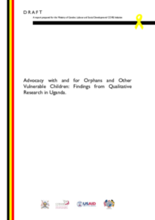In spite of the frequent reference to OVC as a category that befits urgent attention and support by a cross-section of stakeholders, the evidence suggests that the priority which is accorded to this category of children in planning and budgeting is rather low. A number of reasons have been advanced to explain this low level of prioritization, one of which is the image that the Ministry of Gender, Labour and Social Development portrays.
This study identifies key issues that need to be addressed in order to raise the profile of OVC in particular and MGLSD in general. OVC issues need to become an essential part of the political commitments made by local and national leaders. Committed advocacy at national and local levels should help to address this concern.
The study concludes that ineffective leadership, organization and management for OVC programming by both the MGLSD and district leaders has led to the further marginalization of OVC issues in planning and budgeting. The study observes that the main hindering factor is the lukewarm image (profile) portrayed by the parent ministry and the CBS department. This is further aggravated by the lack of information and data on OVC, and the absence of innovative alternative propositions on how to address the orphans’ crisis.
One of the biggest assets with respect to OVC programming is the comprehensive policy and institutional framework on OVC. If appropriately supported, this policy and institutional framework can go a long way to persuade central and lower local governments to allocate resources for OVC programmes. The current discussion on promoting social protection approaches and interventions is one possible way in which OVC matters can be brought back to the centre ground.
There exists in Uganda a rich array of potential partners and advocates for OVC advocacy and communication, including the private sector. Child-focused NGOs and agencies also remain key advocates for OVC; however, a lot of suspicion still exists between NGOs and MGLSD on prioritization and methods of work. As such, a strengthened network of child rights organizations, such as Uganda Child Rights NGO Network may be one way of addressing this challenge.
From the study the three key priorities for OVC advocacy that emerged from care givers are improved socio-economic security, better access to health and education services, and increased awareness on the rights and responsibilities of OVC. On the other hand, community leaders emphasized the importance of better regulation of institutions which care for OVC in order to enhance child protection. OVC themselves prioritized advocacy for education, against stigma, for care and support, for socio-economic security and for reintegration and resettlement.
Three main conclusions were also drawn from this study. First, different stakeholders present different advocacy priorities. Second, while OVC and care-givers mainly prioritized issues that were specifically relevant to OVC personal livelihoods, NGOs and others focused on advocacy issues. Third, the range of priority issues suggests a need for a strategy that spans (a) the family and community; (b) the district and sub-county; and (c) the national.
©Uganda Ministry of Gender, Labour and Social Development and CORE Initiative

